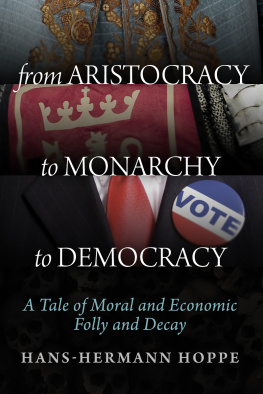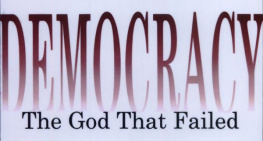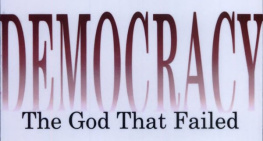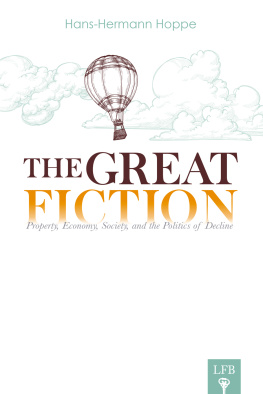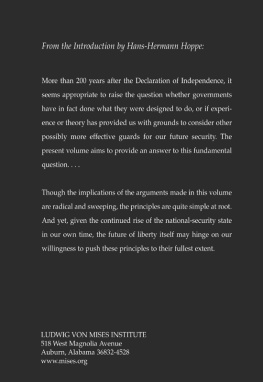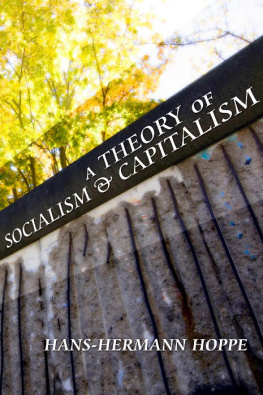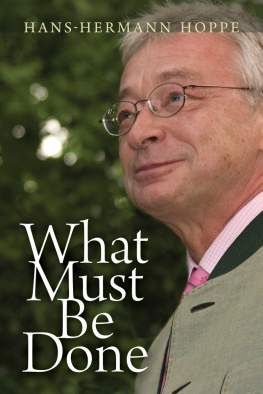The Mises Institute dedicates this volume to all of its generous donors and wishes to thank these Patrons, in particular:
Adam J. Bagby
Douglas E. French and Deanna L. Forbush
Jing Jin and Wai Chan
Charles and Anne-Lisbeth Sebrell
Elijah Joel Smith
John Tate
Anonymous
John Bartel
Richard Beverly Bleiberg
Herbert Borbe
Jorge Carlos Borlandelli Zeballos
Mary E. Braum
Dietmar Georg
Hunter Hastings
Albert L. Hillman, Jr.
Richard J. Kossmann, MD
David Kramer
Arthur L. Loeb
R. Nelson and Mary Nash
Jorge Roca Arteta
Morten Rustad
Reginald Thatcher
Joseph Vierra
The Morgan Report
Introduction
Hans-Hermann Hoppe is a master of theoretical history. He tells us that
it is not my purpose here to engage in standard history, i.e., history as it is written by historians, but to offer a logical or sociological reconstruction of history, informed by actual historical events, but motivated more fundamentally by theoretical philosophical and economic concerns.
The work of Carl Menger and Ludwig von Mises on the commodity origin of money is a prime example of what Hoppe has in mind.
In carrying out his illuminating project, Hoppe finds himself in opposition to the dominant way of looking at the evolution of government. According to this perspective, government has over the centuries become ever more democratic. Rule by the people is the final form of government; once it has been reached, history, at least as far as government is concerned, has ended. This historical movement, further, is a good thing. It is the triumph of freedom. History is the story of progress.
Hoppe is not a complete pessimist like the Gloomy Dean W.R. Inge, who, in his famous Romanes Lecture of 1920, denounced the superstition of progress. To the contrary, Hoppe thinks that in economic life, the Industrial Revolution enabled mankind to achieve an unprecedented level of prosperity.
In government, though, matters are entirely different, and here Hoppe is a firm opponent of progressive orthodoxy. For him, rather, history in this area is a tale of a fall not from the Garden of Eden but rather from a reasonable way of settling disputes.
How would real, rational, peace-seeking people have solved the problem of social conflict? ... What people would most likely accept as a solution, then, is this: Everyone is, first off or prima facie, presumed to be owner endowed with the right of exclusive control of all those goods he already, in fact, and so far undisputed, controls and possesses. This is the starting point. As their possessor, he has, prima facie, a better claim to the things in question than anyone else who does not possess these goods and consequently, if someone else interferes with the possessors control of such goods, then this person is prima facie in the wrong and the burden of proof, that is to show otherwise, is on him. However, as the last qualification already shows, present possession is not sufficient to be in the right.
Hoppe assumes that everyone agrees on the appropriate principles for settling property disputes:
The criteria, the principles, employed in deciding between a present controller and possessor of something and the claims of another person are clear then, and it can be safely assumed that universal agreement among real people will be reached regarding them.
To reiterate, Hoppe sees property as antecedent to the state; people in a state of nature will rationally agree on the appropriate principles.
The fact that people agree in this way does not solve all problems. Principles must still be applied to concrete issues; and here arises the likelihood of disputes. If people dispute property titles, what is to be done? Hoppe suggests that people would gravitate toward certain natural leaders deemed trustworthy to decide cases in an unbiased way:
In order to settle their conflicts and to have the settlement lastingly recognized and respected by others, they will turn to natural authorities, to members of the natural aristocracy, to nobles and kings. What I mean ... is simply this: In every society of some minimal degree of complexity, a few individuals acquire the status of a natural elite. Due to superior achievements of wealth, wisdom, bravery, or a combination thereof, some individuals come to possess more authority than others and their opinion and judgment commands widespread respect.
Hoppe here shows himself to be a true Jeffersonian. In a letter to John Adams, written on October 28, 1813, Jefferson said:
I agree with you that there is a natural aristocracy among men. The grounds of this are virtue and talents.... The natural aristocracy I consider as the most precious gift of nature, for the instruction, the trusts, and government of society. And indeed, it would have been inconsistent in creation to have formed man for the social state, and not to have provided virtue and wisdom enough to manage the concerns of the society.
Is the process Hoppe has set forward more than just speculation? Hoppe looks to feudal Europe for confirmation of his line of thought.
Feudal lords could only tax with the consent of the taxed, and on his own land, every free man was as much of a sovereign, i.e., the ultimate decision maker, as the feudal king was on his.... The king was below and subordinate to the law.... This law was considered ancient and eternal. New laws were routinely rejected as not laws at all. The sole function of the medieval king was that of applying and protecting good old law.
An obvious objection is likely to occur to readers, but Hoppe is ready for it: What Hoppe has described is a Utopia that never was, on sea or land The Middle Ages were in fact a period of large scale oppression. Hoppe replies,
I only claim that this [feudal] order approached a natural order through (a) the supremacy of and the subordination of everyone under one law, (b) the absence of any law-making power, and (c) the lack of any legal monopoly of judgeship and conflict arbitration. And I would claim that this system could have been perfected and retained virtually unchanged through the inclusion of serfs into the system.
Unfortunately, matters did not develop in this happy way. Instead, kings seized more and more power. They claimed to have final authority, rejecting appeals to competing authority within the territories they controlled. Hoppe finds it easy to understand why kings might endeavor to arrogate such power to themselves, but another question is at first puzzling. How were the kings able to succeed in their grasp for absolute power? Why did not the partisans of the old aristocratic order thwart them?
Hoppe offers a two-part answer to this mystery. First, the king allied with the people against the aristocracy.
He appealed to the always and everywhere popular sentiment of envy among the underprivileged against their own betters and superiors, their lords. He offered to free them of their contractual obligations vis--vis their lords, to make them owners rather than tenants of their holdings, for instance, or to forgive their debts to their creditors, and could so corrupt the public sense of justice sufficiently to render the aristocratic resistance against his coup futile.
In this grasp for power, the king had the aid of the court intellectuals. They propagandized on behalf of the king, supporting the thesis that the king represented the people.
The demand for intellectual services is typically low, and intellectuals, almost congenitally, suffer from a greatly inflated self-image and hence are always prone to and become easily avid promoters of envy. The king offered them a secure position as court intellectuals and they returned the favor and produced the necessary ideological support for the kings position as absolute ruler.
Next page
